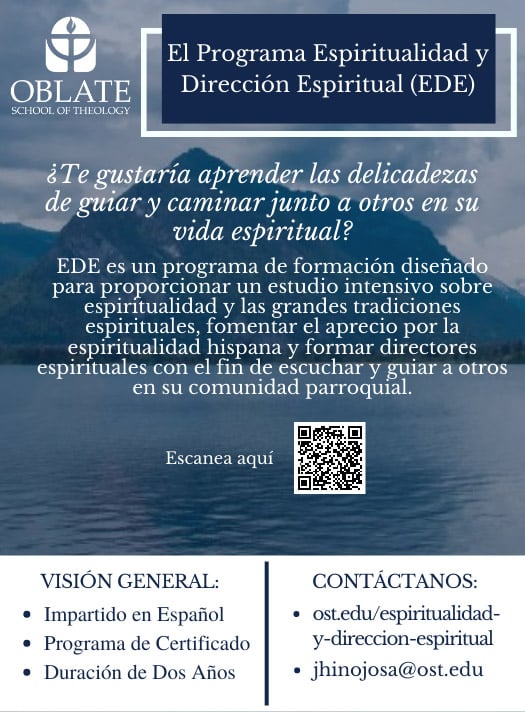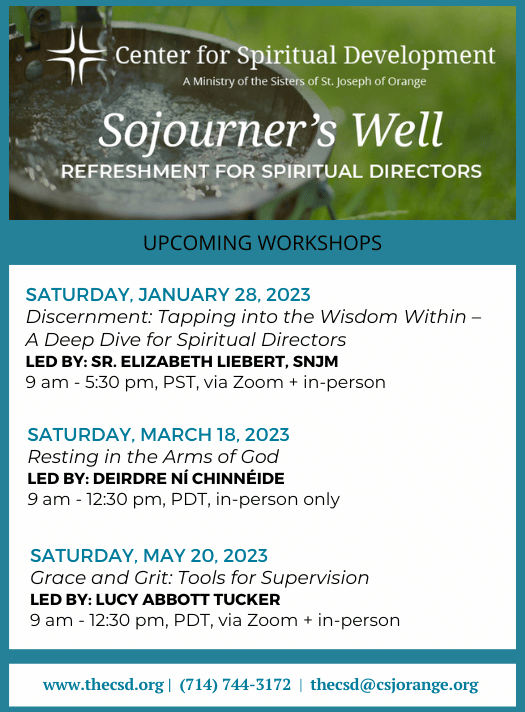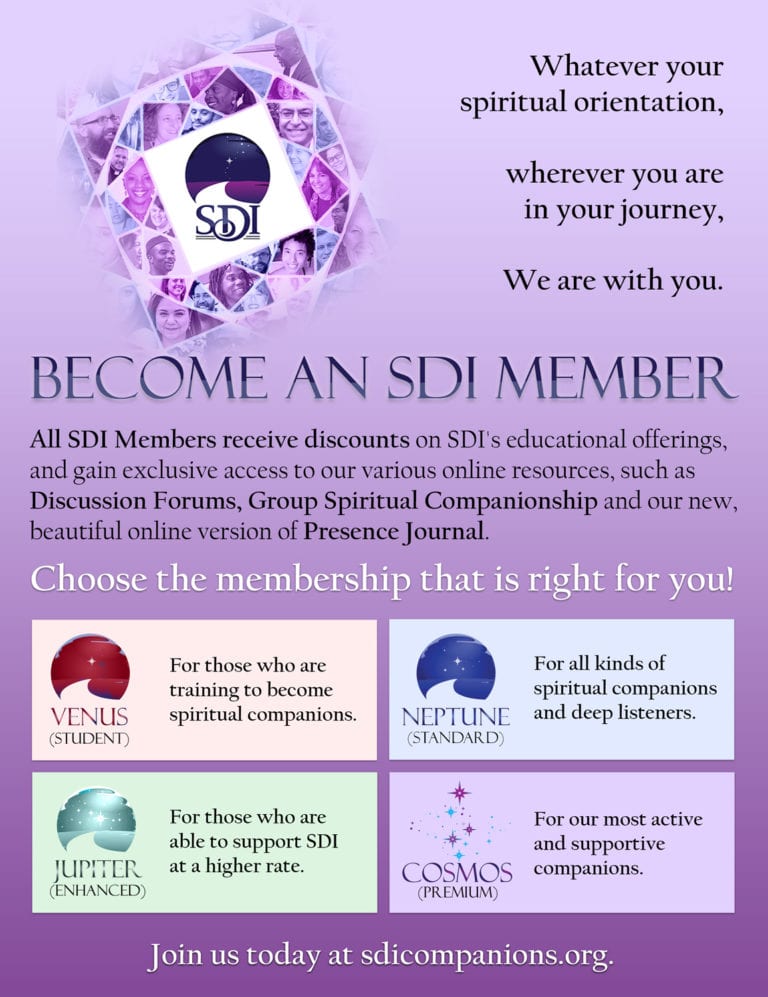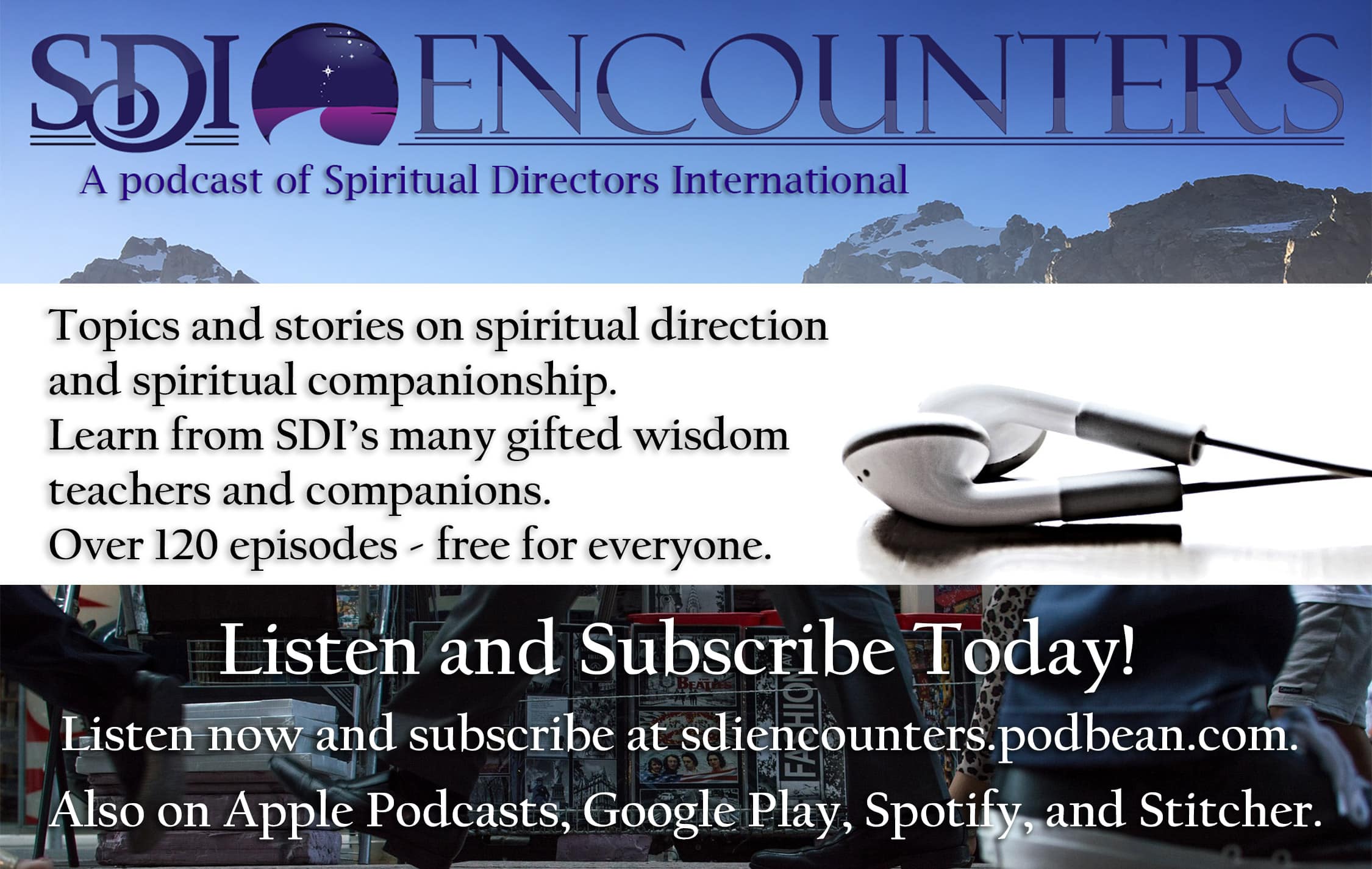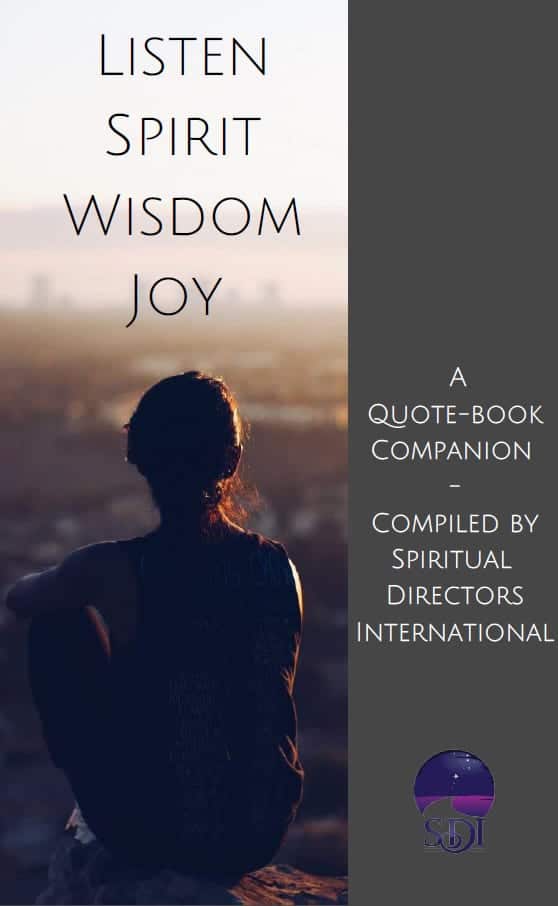Transcendent Impermanence and Spiritual Companionship

by Reverend SeiFu Anil Singh-Molares
(Editor’s note: As many of you know, Rev Seifu is a Zen Buddhist priest and Buddhist Spiritual Companion. In this issue of Listen, he shares a Buddhist perspective on spiritual companionship, which he hopes resonates with many of you, regardless of your own faith tradition or spiritual orientation.)
“Vaya-dhamma sankhara” were the last words uttered by the Buddha according to the Mahāparinibbāṇa Sutta (6:8. 350-320 BCE), “All conditioned things have the nature of vanishing.”
And elsewhere, the Buddha speaks of the three “marks” of phenomenal existence, and identifies the basic one as “Anitya,” or “impermanence,” with the other two being “Anatta” or “no abiding self,” and “dukkha,” or “struggling.”
Of course, the last words of the Buddha gives them particular importance, and indeed the impermanence of things is the foundation of all classical Buddhism.
Impermanence is easy to understand, conceptually, and hard to experience, temporally. Nothing lasts. Everything is subject to decay. We all die. Losses and heartbreaks pain us deeply. And all of our supposedly “fixed” architectures, whether they be ideas, buildings, bank accounts, our very own bodies, or just about anything else we can conjure, drift away like smoke from a fire.
And yet, impermanence has much to commend it: it is, after all, the only truly “permanent” reality that we can count on. Similarly to grounding ourselves in groundlessness, once we learn to navigate impermanence as the only constant, it can be a boon in myriad ways.
These insights combine with the Buddha’s well known proclamation about spiritual companionship in the Upaddha Sutta, in which he says that “Admirable friendship, admirable companionship, admirable camaraderie is actually the whole of the holy life”(SN 45.2). This blending provides a wonderful road map for spiritual companions, guides or directors, or however you might refer to yourself in practicing our common calling.
How so?
Because once we become aware of the reach of the impermanent, we can also learn to more fully appreciate the significance of each and every moment, and of being as mindful and kind as we can when we speak, embrace, cry, struggle, appreciatively affirm, discern, and support. If each and any moment might truly be our last, why not make maximal efforts to be open hearted as much and as often as we can?
In this sense, impermanence is a gateway to loving mindfulness in our practice as spiritual companions, as well as in our daily activities. And it is ushered in by heartbreak, and its attendant, trauma. So that you might say the impermanent breeds Love.
And in terms of traumas, when we are able to process them through our dark nights of the soul, we can help establish the conditions to crack the code of the universe, and to remember and reconstitute our selves down to our true spiritual DNA, as true dwellers of the Eternal.
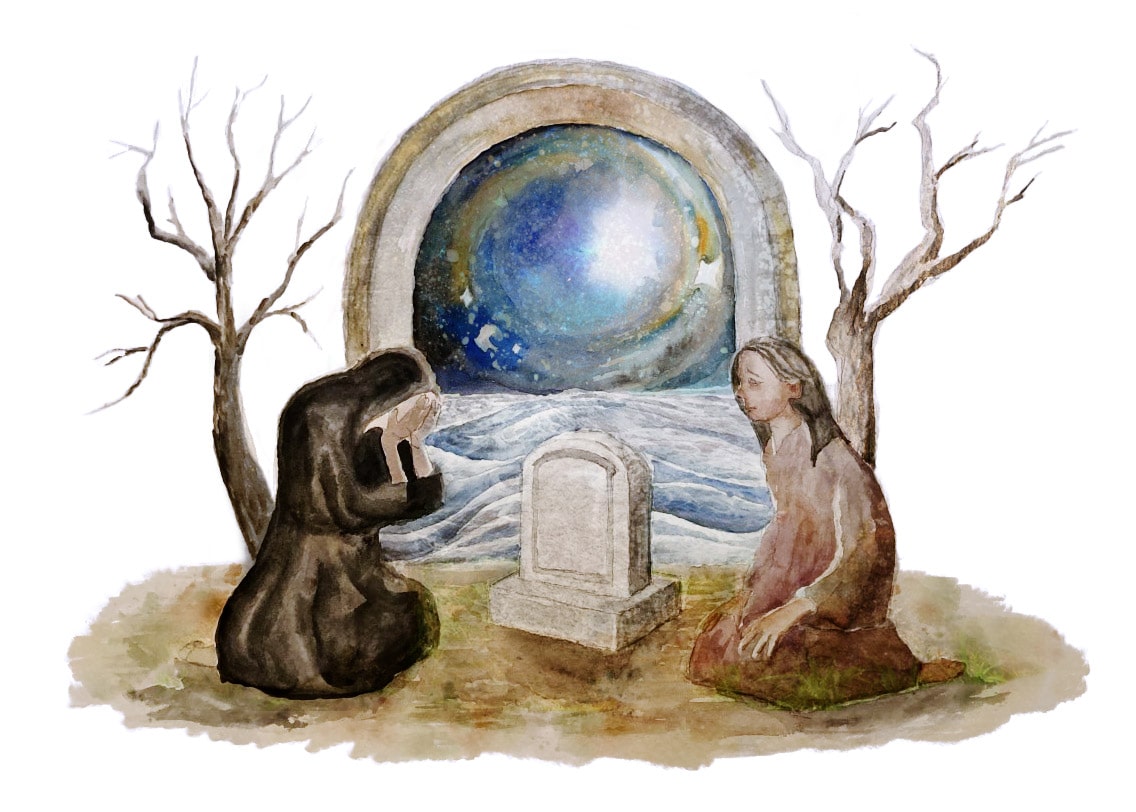
Illustration by Matt Whitney
In this more ultimate sense, then, the worst and most horrible things that can happen to any of us–all of them tied to having our innocence rattled and shattered, our expectations betrayed, to misfortunes and tragedies, and to “losing” things that we thought belonged to us, and might last forever–all of those can actually become the portals by which we regain access to forever. A process which is made much easier with the support of our spiritual companions.
Ultimately then, the terms “impermanent” and “transcendent” really can’t be disconnected, for they belong together, as inseparable, and ultimately indistinguishable, partners in our quest to remember our wholeness and integrity with all that was, is, and will be. And they are both unavoidable, and indispensable, tools of insight and understanding for spiritual companions and those we tend to.
***
Illustration by Matt Whitney
Ultimately then, the terms “impermanent” and “transcendent” really can’t be disconnected, for they belong together, as inseparable, and ultimately indistinguishable, partners in our quest to remember our wholeness and integrity with all that was, is, and will be. And they are both unavoidable, and indispensable, tools of insight and understanding for spiritual companions and those we tend to.
***

Illustration by Matt Whitney
ABOVE THE OCTOBER GARDEN
Magpie chides.
Morning glories burst
out next
to late cosmos.
Above the October garden,
alive with color as leaves fall,
the sandhill cranes gargle
the invitation to be present.
Here and now the sun shines
on sedum, autumnal glory,
feeding bees and wasps
before the first hard frost.
For all the ways malope and lavatera
look similar, their seeds
decry their differences
and their sameness as they nestle
beneath the soil with hollyhocks and calendula,
asclepius and dill.
The long dark sleep, and cold
of winter lies ahead,
but just for now the
sun shines, the sweet peas bloom
the lacewings hunt their lunch
as the sounds of outdoor recess
and sandhill cranes call for attention.
With marbles in their mouths and
migration in their instincts, they shout praise from
heights unfathomable by buried seeds and earth dwellers.
“Do you call every time you fly
or just when migrating?
Are you talking to one another
like gabbling geese in the farmyard,
always in conversation?
Or is this your sublime praise for clear skies,
the smell of campfires,
the colors of zinnias?”
“Can you see the morning glories?” I call.
“They came out in a bundle just for your flying day!
Do you know that when I hear you,
I shout for all my companions to come and see?”
You are the gold in the sky today,
Small flecks riding Saskatchewan thermals briefly
before carrying on to skies over Montana,
over Wyoming, over Colorado,
before finding winter homes in Cuba and Mexico.
You are the seeds of hope planted before the deep dark days of winter,
laid down beside the glorious colors, rich textures,
to inhabit our imaginations
growing peace and joy
while we yearn for your next migration.
Rooted in the prairies, Jennifer Holtslander turns toward spiritual formation for hope in challenging times. As an online Spiritual Director and hospital Spiritual Care Provider, Jennifer values presence and conversation. Her book, We Love Your Invitations, is available through livingfaithathome.ca. She lives with her family in Regina, Saskatchewan, Canada.
“Impermanence is a gateway to loving mindfulness in our practice as spiritual companions, as well as in our daily activities. And it is ushered in by heartbreak, and its attendant, trauma. So that you might say the impermanent breeds Love.”
Rev. SeiFu
MY SOUL’S SYMPHONY
MY SOUL’S SYMPHONY
The scales of my past
Refrains carried
Forward—dissonant chords
Of painful memories
Movements
In the composition
Of life. Harmonious
Melodies—times of joy
Swell
To a crescendo.
My soul’s symphony
Played by an orchestra
of angels.
Rabbi Debra Smith (Reb Deb) is the Founder and Spiritual Leader of Or HaLev Jewish Renewal Community in Morris County, NJ. She is also a Clinical Social Worker and Marriage and Family Therapist. She works extensively in the Multi-faith world, facilitating dialogue among those of different faiths.
“Only when it’s dark enough can you see the stars.”
Martin Luther King, Jr.
Publisher: Spiritual Directors International
Executive Director and Editor: Rev. Seifu Anil Singh-Molares
Production Supervisor: Matt Whitney
Web Designer: Ann Lancaster
Submissions: [email protected]
Advertising: [email protected]
Listen is published four times a year. The names Spiritual Directors International™, SDIWorld™, and SDI™ and its logo are trademarks of Spiritual Directors International, Inc., all rights reserved. Opinions and programs represented in this publication are of the authors and advertisers and may not represent the opinions of Spiritual Directors International, the Coordinating Council, or the editors.
We welcome your feedback on any aspect of this issue of Listen, or on SDI as a whole. Please send your comments to [email protected]

The Home of Spiritual Companionship
PO Box 3584
Bellevue, WA 98009






